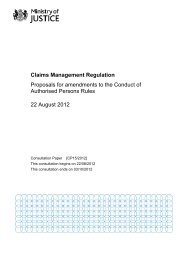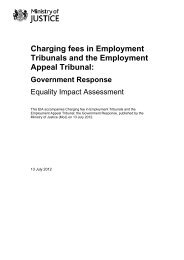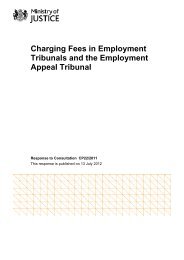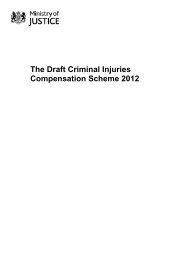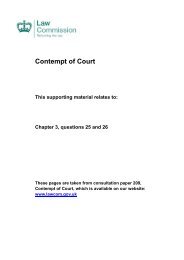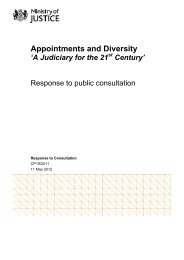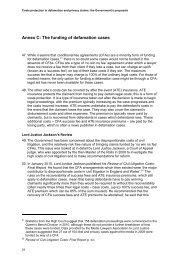Administrative Justice and Tribunals Council ... - Consultation Hub
Administrative Justice and Tribunals Council ... - Consultation Hub
Administrative Justice and Tribunals Council ... - Consultation Hub
Create successful ePaper yourself
Turn your PDF publications into a flip-book with our unique Google optimized e-Paper software.
<strong>and</strong> the virtuous <strong>and</strong> cost reducing cycle which comes from feedback <strong>and</strong> learning. Cost<br />
The introduction of judicial nomenclature <strong>and</strong> the cultural attitudes of the judiciary into<br />
Service this was not their fault. They were simply overwhelmed by the wave of<br />
The AJTC, seeing the progress that was being made, gritted its collective teeth <strong>and</strong><br />
tribunal estate <strong>and</strong> with the Ministry of <strong>Justice</strong> estate more widely. An expensive mistake<br />
through the system, at a cost which incidentally would have paid for the AJTC’s modest<br />
opportunity to return to a more user focused line of best fit.<br />
savings have also not been as rapid as hoped for, particularly in the rationalisation of the<br />
expenditure levels for some years to come. From a user point of view, the promised<br />
sought to remain supportive in the expectation that at some point there would be an<br />
necessary cost reduction which is sweeping across the United Kingdom <strong>and</strong> elsewhere.<br />
will be opportunities to renew their introduction in future, In fairness to the <strong>Tribunals</strong><br />
multi purpose hearing centres never materialized after the first, although hopefully there<br />
was also made in attempting to rationalize technology to manage the flow of cases<br />
informality <strong>and</strong> drive tribunal justice further from its linkages with both service provision<br />
which the tribunal chairs (now judges) are being absorbed will over time militate against<br />
the <strong>Tribunals</strong> Service, ab’e to create some economies of scale but perhaps more<br />
importantly from the viewpoint of fairness, to begin to converge a wide variety of<br />
variety of administrative back offices into a more coherent chamber system but there is<br />
the reforms have not however been without penalty.<br />
much more to do. These changes which might be regarded as the tangible benefits of<br />
approach. It was done very quickly, as was the relatively seamless transition from a<br />
procedural rules from many jurisdictional areas into a more coherent <strong>and</strong> consistent<br />
An important step along the journey to a more coherent system of AJ was the creation of<br />
<strong>and</strong> coherenhly across all its activities —<br />
values, such is the competitiveness <strong>and</strong> fragmentation which is driven by national<br />
in<br />
my jargon to adopt corporate st<strong>and</strong>ards <strong>and</strong><br />
The second is because no department of government has ever been able to persuade<br />
central government (or for that matter local government) of the need to act consistently<br />
The first is simply because the Ministry of <strong>Justice</strong> is oniy one department of government.<br />
not only to be fair <strong>and</strong> impartial but be seen to be fair <strong>and</strong> impartial. Advocacy for such<br />
politics.<br />
a principle cannot be maintained by any one department of government for two reasons.<br />
A fundamental feature of AJ since Franks <strong>and</strong> since reinforced by Leggatt is the need<br />
authority <strong>and</strong> continuity of its membership <strong>and</strong> secretariat <strong>and</strong> at very low cost.<br />
based on fundamental principles which have been maintained over decades through the<br />
involved the persistent application of influence <strong>and</strong> expertise at a detailed level, often<br />
independent voice which could champion informality, fair treatment, actual <strong>and</strong><br />
advocate for fair treatment. Much of its work has been ‘behind the scenes <strong>and</strong> has<br />
to st<strong>and</strong> at least partially outside central <strong>and</strong> local government <strong>and</strong> provide an<br />
Franks demonstrated the need for a body, first the <strong>Council</strong> on <strong>Tribunals</strong>, now the AJTC<br />
approach preserved insight <strong>and</strong> access to government departments which might not<br />
procedural fairness <strong>and</strong> support for users short of campaigning. A non campaigning<br />
otherwise have been forthcoming but arguably also weakened the AJTC’s profile as an<br />
my view to unlearn the fragile lessons of Franks learned over more than half a century.<br />
AJTC but also the continued absorption of tribunal justice into the court system seek in<br />
the l<strong>and</strong>scape has never been greater. Current proposals, not just for abolition of the<br />
duplication. Against this background, the need for a body to exercise some oversight of



